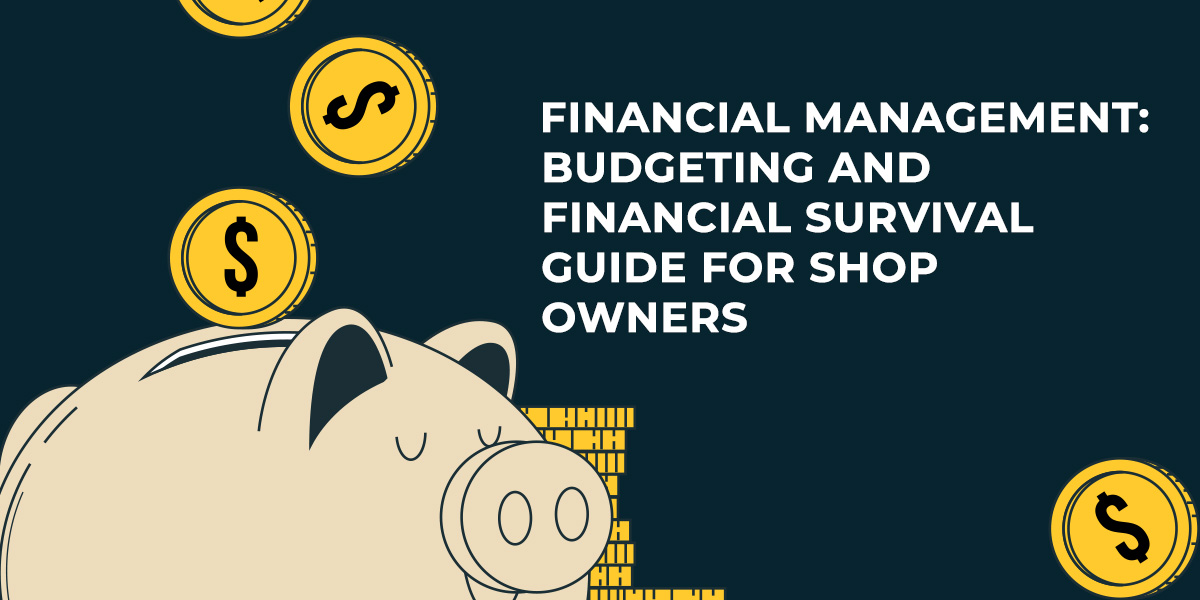Financial Management: Budgeting and Financial Survival Guide for Shop Owners
Math required? Outrageous! Yes, for most of us, math is an unavoidable evil. Unfortunately for business owners, it’s a glaring reality that requires full attention. Retail business finances can be a treacherous realm that makes or breaks a shop’s chance at success. Luckily, we have just the remedy: our financial survival guide for shop owners.
We’ll show you financial management tips you can use to avoid financial pitfalls, make informed financial decisions, and ensure you can steer your business through the many unexpected challenges of today’s often volatile retail economy.
Financial Management Tips: Understanding Your Shop’s Financial Landscape
Financial management covers all aspects of your business’ health, from business planning and budgeting to cost-cutting, bookkeeping, credit-building, and more. Neglecting your business’s financial health can have catastrophic results. So, whether you hire a financial professional to manage your finances or go it alone as a DIY accounting superstar, staying in tune with your shop’s finances is vital to its long-term health.
Keeping a keen eye on your shop’s financial functionality, including profitability, efficiency, and solvency, also lets you implement strategies to successfully identify and overcome any financial obstacles that come your way. You can pivot no matter the economic outlook, ensuring your business’s financial health stays steady and true. It starts with examining the financial landscape, understanding how it affects your business, and setting attainable financial goals.
Creating Budgeting Strategies
A clear budget and vision guides successful retail businesses, yet it can be all too easy for that vision and all its moving parts to overshadow sound financial strategies. Businesses can also be derailed by generic budgeting tactics that don’t cater to the unique requirements of retail shops. So, whether you have an existing retail shop or are starting from scratch, set reasonable expectations when budgeting for your business.
Developing a realistic budget helps maintain financial responsibility and flexibility that lets you home in on your shop’s specific financial needs at any given moment while building towards that original vision. A quick dive into your shop’s books provides information crucial to setting realistic, financially viable budgets that give your business the best chance to succeed.
Consider everything you need for your business to function when examining your books. A few of the many operating costs you want to consider might include:
- Payroll
- Inventory
- Marketing
- Interest Payments
- Taxes
- Fees and Commissions
- Rent
- Utilities
When examining your retail shop’s financial health, pay close attention to cash flow and profit/loss. This gives you a better idea of your shop’s current financial state. So, you’ll be able to pinpoint the budgeting strategies that get your business safely where you want it to be.
Expense Prioritization and Cost-Cutting Measures
Financial survival relies heavily on a business owner’s ability to prioritize business costs, trimming unnecessary expenses wherever possible. Deciding what’s excessive and what’s indispensable sounds easy enough. However, it can be like getting rid of that lucky shirt or comfy, worn-out sweatpants hanging in your closet that you never wear anymore. Parting with them seems unfathomable. However, you can use some techniques to help ease the pain of choosing what stays and what must go.
Study Your Books
Regularly examining your books is always a good idea, and it is doubly so to identify ways to cut costs. So, set aside time to review financial information that points to unnecessary spending and those expenses that take precedence over all others. Reevaluating costs can be a real grind, yet taking a hard, honest look at finances puts your business one step closer to success. So, implementing cost-cutting strategies helps expose “necessary” expenses that, under closer scrutiny, might not be needed after all. Your business will be all the healthier for it.
Keep the Flow Moving
Tracking your business’s cash flow is a great way to gauge how expenses affect cash availability and overall business growth. You can pinpoint expenses that might cause a bloated cash outflow and, in turn, a sluggish cash inflow. The info you glean from cash flow tracking allows you to adjust your budget to remove weak links and bolster your business’s financial capabilities.
Mind Your ROI
As you examine your books, pay close attention to the ROI, or return on investment of business expenses. ROI is great for understanding various business functions, from setting annual budgets to marketing strategy implementation. ROI is also a handy statistic when looking for ways to remove costs. Expenses that show little or no return on investment might be candidates for cost-cutting measures. For example, a small marketing agency delivers a much higher return on investment than a larger, high-cost agency, putting more money in your pocket.
Spread the Tax Love
If you have done all the cost-cutting you are willing to do, then you can look for ways to redistribute costs over a longer period. This can help improve cash flow and long-term financial stability. Tax payments are a prime example here. Paying estimated tax payments monthly rather than quarterly minimizes the hit on your shop’s cash flow while still fulfilling tax responsibilities. This also helps streamline the budgeting process by allowing you to treat tax payments as a regular monthly expense instead of a special quarterly headache.
Swap Your Adding Machine For Accounting Software
Accounting programs can reduce even the most complicated formulas to straight and to-the-point data you can use to enhance your business’s financial health. Accounting programs are great tools to determine which of your business’s financial areas require immediate attention. In addition, you can look at your cash flow and expenditures at a glance to make quick yet informed cost-cutting decisions, including how you might reprioritize or streamline billing operations to improve efficiency.
Financial Planning for Uncertain Times
No matter how well-crafted your business strategies are, unexpected economic challenges are inevitable. So, you want your retail business to have the flexibility and strong financial health to weather whatever obstacles come your way. Financial planning is the key to anticipating issues and pivoting to ensure your business never misses its stride.
Business Contingency Planning
You’ll have a head start on business contingency planning when you regularly delve into your business’s financials. From optimizing assets, liabilities, and equity to cultivating high credit ratings, fine-tuning your shop’s financial structure lets you plan for shifting economics, no matter how small or large the change. Profit and loss statements, cash flow levels, break evens, and other indicators will clue you into what aspects of your business need shoring up to better protect against economic difficulties.
Explore Alternative Growth Opportunities
When constructing contingency plans for your business, don’t be afraid to look at other growth opportunities that might bolster your financial presence. Diversifying your retail business allows you to absorb economic changes and keep your business on a steady course to sales growth. A retail marketing and finance professional can help you identify, research, and implement growth opportunities that make the best sense for your shop.
Funding Retail Shop Financial Health
Taking advantage of the many retail business financing options available today ensures your business maintains the funding necessary to keep it firing on all cylinders. Traditional bank and small business loans are tried and true methods. Yet other sources might prove beneficial when searching for more financial flexibility. Short-term business loans and small business grants can give your business a budget-friendly extra boost. Crowdfunding platforms, such as GoFundMe and Kickstarter, are options that are growing in popularity and generate funds through public investment.
Seeking Professional Financial Guidance
While some business owners are accounting wizards, most learn retail business accounting on the fly out of necessity. Accounting requires constant attention that most business owners don’t have time to give. Accounting software is a huge benefit, yet it still requires someone to plug in and decipher information. That’s where professional financial help comes in.
Adding a financial pro to your business team brings many benefits worth the added expense. An accounting expert can provide a different perspective for improving your business finances that you might not have otherwise considered. Also, with finances under the watchful eye of a professional, you can get back to leading your business to newer heights. There is no shame in asking for financial guidance. Only the chance of regret if you don’t. So, seek out finance pros that best fit your retail business’s needs.
Unleash Your Shop’s Potential with Financial Security
By combining good bookkeeping habits, sound budgeting strategies, digital accounting tools, professional guidance, and forward-thinking financial planning, you’ll have everything you need to unload the clutter and get to the bare essentials that let your business soar.
Are you ready to put the financial survival guide for shop owners to work for you? Of course, you are! Our team can help you find the right financial path and give your bottom line the boost it deserves. So, contact us today and let’s flex our math muscles to take money-making to another level.
Digital Marketing No To The Quo



